by Donald Kirk
U.S. Secretary of State Rex Tillerson may be on his way out after displeasing President Trump with his repeated calls for a diplomatic solution to the North Korean crisis.
Tillerson’s desire to avoid the threat of a pre-emptive strike on the North’s nuclear and missile facilities is sharply at odds with Trump’s vow to inflict “fire and fury” on the North. Tillerson has said his views do not differ from those of the president, but the record shows he’s not interested in going along with a hawkish stance that would appear to nullify any chance of negotiations or dialogue with North Korea.
The conflict between Trump and Tillerson reflects the deep uncertainty among U.S. officials as to why North Korea’s leader Kim Jong-un wants to pursue his nuclear program and what to do about it. Trump has called Kim “little rocket man” but fears an attack on North Korea would trigger a response in which several million people could be killed in days.
In weighing the odds on whether North Korea would fire missiles on the South, Trump would prefer to follow the advice of CIA director Michael Pompeo rather than count on Tillerson to say what he would like to hear. The upshot is that, even if Trump never goes to war against North Korea, he would feel more comfortable with Pompeo as secretary of state. He could then be sure that he was getting the hardest-line advice possible.
Another name sometimes mentioned is that of Nikki Haley, the U.S. ambassador to the United Nations, who has made strong statements in the United Nations while Tillerson has remained largely silent.
The impending shakeup, if it actually happens, would bring the United States closer to a war that most Americans would prefer to avoid. Short of war, Trump’s only way to retaliate against North Korea for its latest test of a long-range intercontinental ballistic missile is to impose ever stiffer sanctions — and to try to get other countries not only to support a new set of sanctions but to break off diplomatic ties.
The bickering among high U.S. officials betrays the inherent weakness of the U.S. government in the face of the determined North Korean dictator. The fact is that none of America’s highest officials has come up with a convincing plan to get Kim Jong-un to agree to come to the table for talks while American politicians debate Trump’s tax plan and the headlines are full of stories of movie executives and political figures alike making unwelcome passes at women.
Adding to the distress of the Trump administration is that nobody seems to know how to counterattack North Korean missiles. The latest model, the Hwasong 15 was proven to be able to hit targets in the United States by soaring 2,800 miles above the Earth’s surface before coming down 600 miles from its launch site.
Why has the United States not been able to develop a counter-missile capable of shooting down whatever North Korea is firing? And what was the point of the controversial counter-missile battery known as THAAD — for Terminal High-Altitude Area Defense — if it could not be deployed to fire at North Korean missiles?
Those are difficult questions to which no one in the U.S. government or ruling establishment has definitive answers. All that officials can say is that shooting down an enemy missile is not only technically extremely difficult but also unbelievably costly. The United States and Japan, which shares Washington’s concerns, have yet to do anything substantive to fend off North Korean missiles.
Thus the impression is inescapable that Trump, while he talks tough, still has to believe that China’s President Xi Jinping will exercise the leverage needed to bring Kim Jong-un to his senses. Trump may have formed a warm relationship with Xi beginning with their meeting at his Mar-a-Lago, Florida, home in April, but he does not seem able to punch a dent in China’s desire to remain on good terms with the North for the sake of regional stability.
Amid all such questions, however, one figure appears to remain secure in his position. That’s Jim Mattis, the retired four-star Marine general, now secretary of defense. Mattis also has said that he would hope for a negotiated solution rather than place the lives of millions of Koreans in both North and South at risk.
Nonetheless, Mattis has been enthusiastic about deploying aircraft carriers with dozens of warplanes on their decks in waters around the Korean peninsula and also sending B1 bombers based at Andersen Air Base on Guam on intimidation flights across South Korea.
In both the naval and air exercises, the United States has been sure to coordinate closely with South Korea’s President Moon Jae-in. He has loudly denounced North Korea’s nuke-and-missile tests but opposes any suggestions for a pre-emptive strike on North Korea. But would the United States really consult closely with Moon if North Korea sent a missile hurtling in the direction of Guam — or toward the new U.S. headquarters base complex at Pyeongtaek south west of Seoul?
Americans and South Koreans alike hope they never have to answer the question.
Donald Kirk has been a columnist for Korea Times, South China Morning Post, and many other newspapers and magazines. Republished, with permission, from Inside Sources. Photo: Rex Tillerson (U.S. Department of State via Flickr).

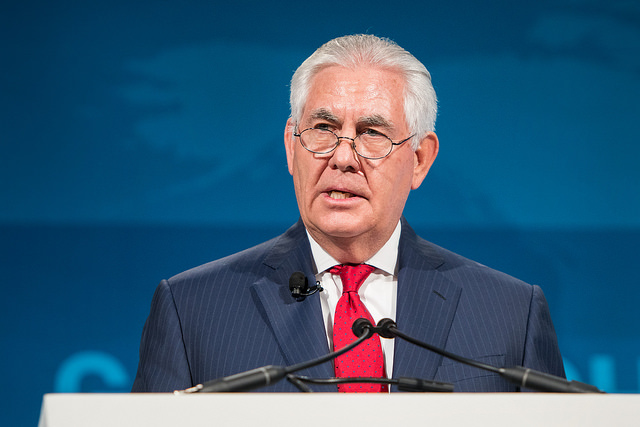
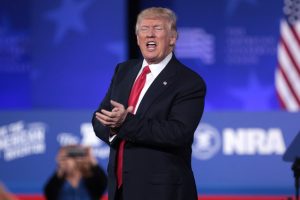
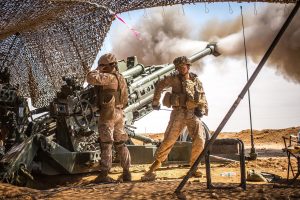
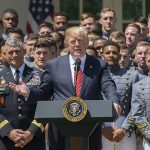
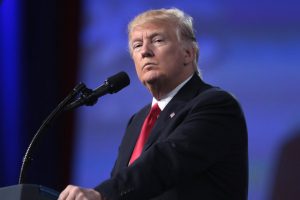
This situation is of greater concern to South Korea and Japan than the U.S.A. and, for that matter, to the majority of the North Korean people who already suffer the most from their dictator and his sycophants. The reality is that nothing is going to stop Kim Jong-un obtaining his nuclear weapon in the next 12-24 months; he sees this being necessary for maintaining his incumbency, not to incur his annihilation which would be inevitable if he used the weapons. He also seeks respect; President Trump should stop twittering; the U.S.A. should do nothing more; ignore him.
Trump is a sadist. When he says that he’ll wipe out the whole country of N Korea he actually loves that thought. He can taste the destruction and he can’t wait. Notice how he talks to his supporters and riles them up into a frenzy of ‘hurt others’. And he stands back and thrills. This is why he’s dangerous. He loves to hurt others.
Why can’t Administration realize that every time it provokes the North Koreans, the North Koreans will respond in kind. It makes no sense for one to pretend to want to negotiate and then insist that the other side accede in advance to one’s demands, or to do an about face and hit the other side with yet another provocation, as the U.S. did with its military exercises in October.
The Russians and Chinese have offered the best approach for untangling this crisis and putting things on a more stable footing going forward, but for some reason, up to now the U.S. hasn’t been willing to accept it.
Despite the rhetoric, this reader’s hope is that Trump and Tillerson are playing a ‘Mutt and Jeff’, ‘good cop-bad cop’ game in public, but are negotiating behind the scenes.
The problem is that THAAD is getting better all the time but is a less than perfect system. If NK launches an ICBM heading for Los Angeles and THAAD misses, that would mean the death of millions of Americans. Trump knows this. This situation should have handled decades ago but president after president bungled it and passed it off to his replacement. Trump has few options left now.
re: “The fact is that none of America’s highest officials has come up with a convincing plan to get Kim Jong-un to agree to come to the table for talks.”
That’s because the US is making demands and has no intention to negotiate, perhaps along the lines of the Russia-China (and DPRK) position whereby the US would cease its provocative military maneuvers (which are in violation of the Armistice Agreement from 64 years ago) and DPRK would freeze its nuclear program.
re: “Trump has called Kim “little rocket man” but fears an attack on North Korea would trigger a response in which several million people could be killed in days.”
Many of the killed would be American, with tens of thousands at nearby megabase Camp Humphreys, unless Americans are evacuated from the country first, thus telegraphing an impending attack.